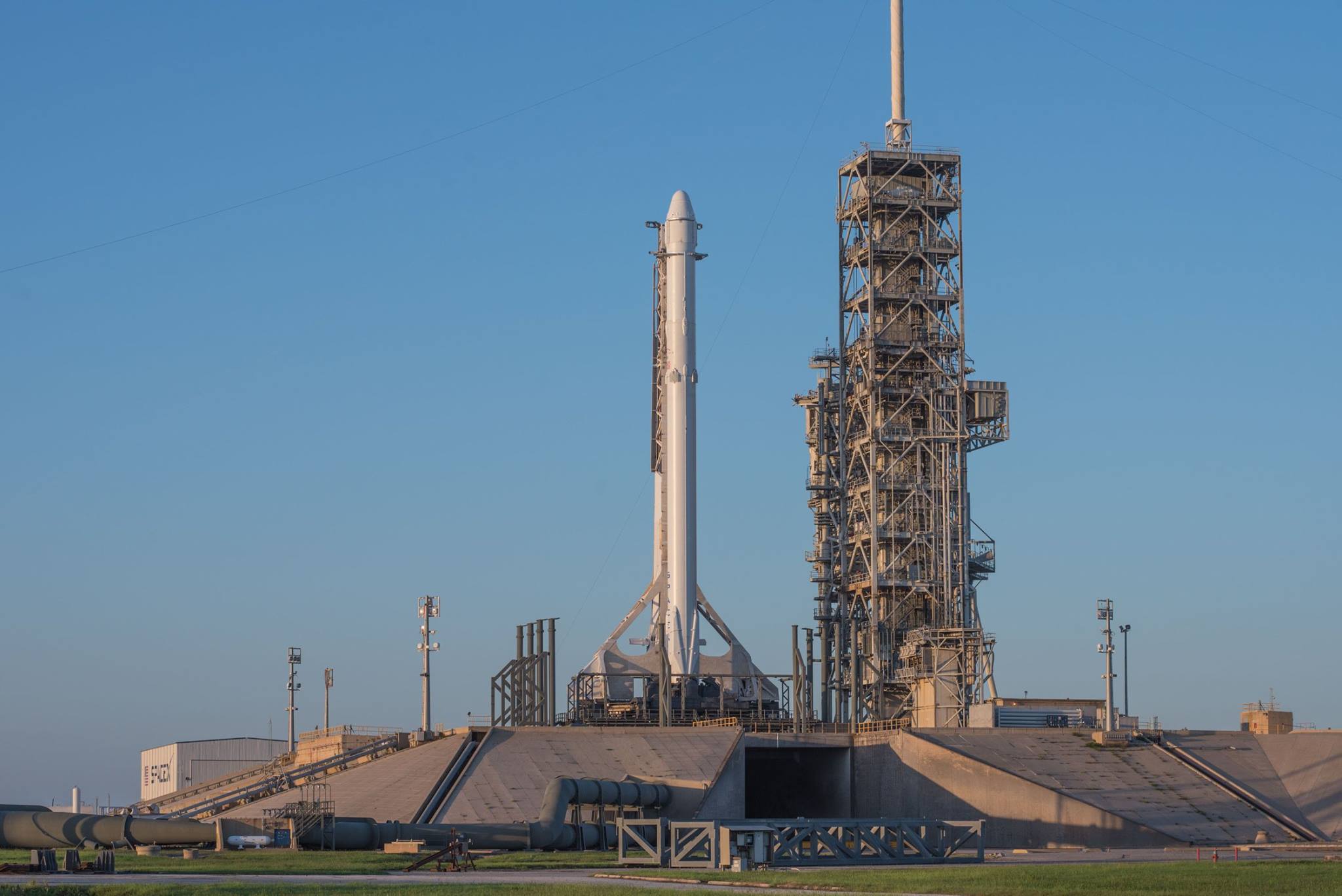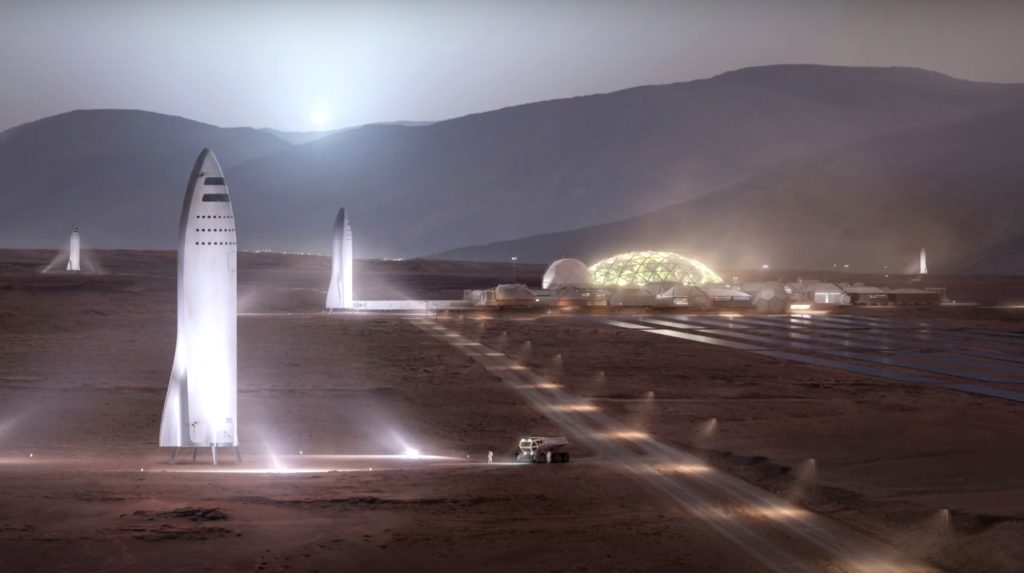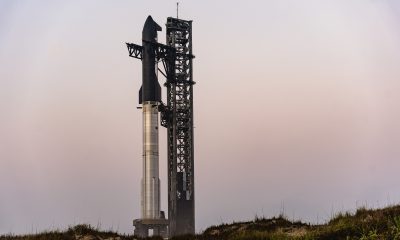

News
SpaceX on track to set record back-to-back Falcon 9 launches, 38 hours apart
SpaceX’s launch schedules have already solidified, but Elon Musk confirmed on Oct. 3 that the company is “aiming for two rocket landings in 48 hours this weekend”. In fact, a brief examination of the schedules suggests that SpaceX could attempt those two launches and landings in as few as 38 hours, easily beating the company’s previous launch cadence record of ~50 hours.
https://www.instagram.com/p/BZzchfKg07f/?taken-by=elonmusk
The two missions planned for “this weekend” are SES-11 on Saturday evening and Iridium NEXT-3 bright and early on Monday, October 9. Mirroring an exciting period of rapid-fire launches earlier this summer, SpaceX will again attempt to conduct two launches from both the West and East coasts nearly simultaneously. Just like the launch of BulgariaSat-1 and Iridium NEXT-3 in late June, the two upcoming launches will make use of one “new” Falcon 9 and one that has been recovered and refurbished. SES-11 will lift off atop Falcon 9 1031, previously tasked with launching the CRS-10 Dragon, and will be the third commercial reuse of SpaceX’s Falcon 9 first stage in 2017.
SpaceX launch schedule
- SES-11 scheduled for Saturday, October 7 at 6:53 pm EDT (3:53 pm PDT) from Kennedy Space Center in Cape Canaveral, Florida
- Iridium NEXT-3 scheduled for Monday, October 9 at 8:37 am EDT (5:37 am PDT) from Vandenberg Air Force Base, CA
Separated by the continental United States, both Falcon 9 boosters will attempt to land aboard SpaceX droneships within a period of 38 hours. Elon Musk proudly touted the fact that SpaceX had successfully recovered 16 Falcon 9 boosters since the company began recovery attempts, with 12 of those recoveries being consecutive successes since June of 2016. If the upcoming launches and landings go as planned, that figure will jump to 14 consecutive recoveries.
The success of SpaceX’s reuse program is undeniable and truly extraordinary given how quickly it has progressed. The program is central to SpaceX’s ultimate goal of creating a permanent human presence on other planetary bodies in the Solar System, something that Musk recently discussed in considerable detail. Developing a robust record of reliability both with launches and landings is a necessity if the company hopes to one day routinely launch and land dozens of passengers aboard their rockets.
In this sense, every single successful launch and every single successful recovery can be seen as small but tangible steps along the path to the Moon, Mars, and beyond.

A hypothetical SpaceX city on Mars. (SpaceX)

News
Tesla contract with Baltimore paused after city ‘decided to go in a different direction’

Last Summer, Tesla landed a $5 million contract with the City of Baltimore for a fleet of electric vehicles for the local government. However, Mayor Brandon Scott decided to pause that investment in September after the City “decided to go in a different direction.”
This is according to John Riggin, spokesman for the city’s Department of General Services. Riggin confirmed that the contract with Tesla has not been fulfilled, and Baltimore is going with other options for the time being:
“No Tesla units have been ordered, and none are in the City’s fleet.”
It now seems that the contract, which was set to be run until 2027, is not really a typical “contract” in the sense of the word. Riggin said the city is not obligated to spend the money for vehicles from Tesla, and that it is evaluating offerings from a variety of OEMs, including Ford and General Motors.
Tesla chosen over Ford for $5 million Baltimore City EV fleet
Riggin said the value of the contract is more of a ceiling and not necessarily an obligation to spend the committed amount in full.
The contract has not been canceled officially, but City Comptroller Bill Henry said to the Baltimore Sun that it has gone back to purchasing Mustang Mach-Es from Ford, the vehicle that was snubbed for Teslas back in July when things were initially decided.

The timing of the pause is interesting, and it does not seem to have anything to do with CEO Elon Musk’s direct involvement with the Trump administration, although the EV maker’s frontman was already vocalizing his distaste for the Democratic White House run by the Biden Administration.
Baltimore has a citywide goal of achieving carbon neutrality by 2045, and has used EVs in its fleet for several years to reach that goal. It plans to electrify the city vehicle fleet by 2030.
News
Tesla at risk of 95% crash, claims billionaire hedge fund manager
Tesla stock has been extremely volatile as of late amidst souring sentiments over CEO Elon Musk’s political leanings.

Christer Gardell, a Swedish billionaire and hedge fund manager, issued a stark warning about Tesla stock and what he believes are bubbles in the stock market. The billionaire’s insights about Tesla were shared during an interview with EFN.
Tesla stock has been extremely volatile as of late amidst controversies and souring sentiments over CEO Elon Musk’s increasingly political leanings.
Alleged Tesla (TSLA) risks
Gardell did not mince words about Tesla, stating that the electric vehicle maker’s valuation could drop as much as 95% due to the “circus” surrounding its CEO.
“Tesla, especially now with the whole Musk circus going on everywhere, is probably the most expensive stock on the global stock exchanges right now. It could go down 95% – and maybe it should go down 95%,” he said in the interview.
The Swedish billionaire sees Tesla as fundamentally a car company. Thus, he does not understand why the market has given the EV maker such a high value. For context, the Tesla story has been changing in recent years, with the company growing its energy business and delving into AI and robotics.
Gardell Slams “Eternal Bubble“
Gardell believes the EV maker has become a poster child of sorts of a market that has become speculative, where share prices do not reflect true valuations anymore, as noted in a CarUp report. The hedge fund manager noted that in Tesla’s case, this “eternal bubble” should have burst long ago.
“I have commented that it should have burst over the past five years, but it still hasn’t. The valuation is incomprehensible,” he explained. The hedge fund manager, however, noted that once the crash happens, the decline would be dramatic.
“It’s always hard to say when. It could happen in a month, six months, a year, three years, or five years – it’s impossible to answer. Because there’s so much money dominating the stock market now, and they don’t care about the value of the shares, they speculate on price movements,” he said.
U.S. Stocks Overpriced, Europe Offers Value
Looking beyond Tesla, Gardell flagged broader risks in the U.S. stock market, which he described as significantly overvalued. “American stocks have received very large flows recently. If you look at the American stock market, it is very expensive, both from a purely absolute perspective and from a historical perspective,” he stated.
In contrast, Gardell touted European stocks as a more attractive option for investors. “And the difference between American stocks and European stocks has never been greater. Normally, European stocks have had a discount of 20%, now it is 40%. And that is too high,” he noted.
News
Tesla store shooting incident under investigation

Oregon police are investigating a shooting incident involving a Tesla store.
A Tesla store in Tigard, a city southwest of Portland, was vandalized around 2:00 am on Thursday, March 6.
“The damage was discovered by employees who arrived for work this morning (3/6/25) at the dealership on SW Cascade Avenue. Investigators believe at least 7 shots were fired, damaging 3 cars and shattering windows. One bullet went through an office wall and into a computer monitor. Fortunately, this happened overnight when the property was unoccupied,” stated a Tigard Police report.
Crime scene technicians and investigators are gathering physical and video evidence of the shooting. Tigard Police did not officially announce a motivation for the shooting at the Tesla store. However, they acknowledge that a few Tesla locations have been targeted across Oregon and the nation.
Tesla locations across the United States and abroad have been experiencing attacks recently. Most of the company’s locations experience arson attacks. For instance, in France, around a dozen Tesla vehicles were reportedly torched in a suburb near Toulouse. Meanwhile, in Massachusetts, a few Tesla Superchargers were allegedly set on fire near a shopping center. Tesla protests have also started in various locations.
Police have not provided an official reason or motivation for all the arson attacks and the Oregon shooting because they are still under investigation. However, Elon Musk is definitely at the root of the matter.
Elon Musk has recently found himself the target of plenty of ire in the United States and Europe. Tesla is taking the brunt of all the anger pointed toward Musk.
-

 News4 days ago
News4 days agoSpaceX announces Starship Flight 8’s new target date
-

 News2 days ago
News2 days agoTesla at risk of 95% crash, claims billionaire hedge fund manager
-

 News5 days ago
News5 days agoTesla launches fresh U.S. promotions for the Model 3
-

 News2 days ago
News2 days agoTesla contract with Baltimore paused after city ‘decided to go in a different direction’
-

 Elon Musk6 days ago
Elon Musk6 days agoTesla mulls adding a new feature to fight off vandals as anti-Musk protests increase
-

 Elon Musk3 days ago
Elon Musk3 days agoTesla UK sales up over 20% despite Elon Musk backlash
-

 News6 days ago
News6 days agoTesla starts Model Y ‘Launch Edition’ deliveries in the U.S.
-

 News7 days ago
News7 days agoTesla’s lead designer weighs in on plans for these two Model Y colors



